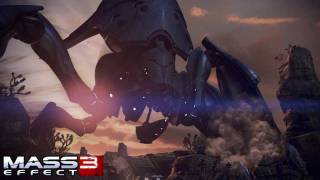The Effects of the Saints’ Ruckus
By Justin258 2 Comments
Here I am, typing my first ever blog post. This past week - well, almost two weeks now – I've done several things. First up is Mass Effect 3. I’m not really here to review it, just discuss my experiences with it. I’ll try to avoid specific spoilers but places and events will be referenced.

I began the game with high hopes. The first two games were great, though I do have issues with them. As far as the gameplay goes, neither had particularly astounding ideas. They could certainly be fun at times but then mediocre firefights set in. Eh, with the exception of a few in the first game, none of them were downright bad, but none of them could compare to the then-fresh in my mind Gears of War 2’s cover based shooting. Biotics didn’t do much to liven things up for me and playing as a straight soldier the first time didn’t either. Mass Effect 3’s controls and combat are undoubtedly the best of the series, but like the first two they’re not going to sell it to you. They work, they’re interesting, and the game can be damn fun at times, but it does dip into samey firefights often enough to be noticeable. Three encounters stand out to me as the best in the game, and strangely enough each one marks the end of an act. They are, in order, the finale on Tuchanka, the finale on the Quarian homeworld, and the game’s last actual firefight. The happenings after each are debatable as far as “quality” goes, and here is where my main issues with the game lie: the writing.
Yes, the one thing that hurt Mass Effect 3 the most for me was the dialogue between characters. If this were any other game, I wouldn’t even bring this up. But this is the series known for its good writing and great characters. This game’s characters aren’t bad at all, but the dialogue they splurt out, especially at the most tense and dramatic of moments, isn’t always up to par. The battle chatter is the worst culprit – it consists almost solely of “We’re gonna do this” peptalks from Shephard. Remember the beginning of the demo where Shephard says that he’ll defeat the Reapers by standing together and fighting? That drivel is spread throughout the entire game. For dramatic effect, it should be used once or twice and then not for long. Here, though, you can bet that it will be done often enough to grate on your nerves. It isn’t always so horrible, but it appears often enough to worry.
What of the much-maligned ending? What, in a nutshell, did I think of it? Well, I thought it was a load of bollocks. Still, the ending is as Bioware made it and I can’t change it. Nor do I want it to change. But this doesn’t mean that it shouldn’t be discussed, as the many threads made so far on the subject have proven. I will repost here a comment I’ve already made.
I didn't like the ending for two reasons:
a) It didn't have any real closure and
b) It didn't take anything discussed over the past two fucking games into account.
A good ending takes everything in the story thus far and culminates it, that is to say, it brings everything to a final point. Like a period in a sentence or a final paragraph in an essay, it wraps up all of a story's themes and ideas and delivers them in an interesting manner. This is why a deus ex machina is generally a bad idea for a story - it's a cop out. Incidentally, this is also why the Crucible is a deus ex machina - despite being introduced in the first few hours, all it does is kill all of the Reapers for you. Or takes control of them for you. Either way, it's not at all a good ending. A better ending of the game would have been Shephard joining all of the races in the galaxy together - Geth included - to fight the Reapers. This would have capped off the story's ideas of bringing humanity to more prominence in this new technological age they've come into. The Illusive Man would have been a great foil to Shephard and could have ended in a more interesting Paragon/Renegade choice. No, instead we just have this stupid spirit-child-Reaper-synthetic thingy that uses logic with more holes than you can think of. Really, the ending says "All right! You've done all this, now just push this button and we're done!"
I didn't play through three games to get to that moment. I played through three games to see Shephard's story culminate in a fantastic conclusion, not to fight some husks and then limp through the Citadel for half an hour.
With all of that said, even an ending that technically works isn’t always a good and satisfying one. May I point out the original Full Metal Alchemist’s ending? For all of you pointing out that Bioware needs to fix it, I point to the movie created after that series ended that was meant to wrap up the story better. It ended with the protagonist having the same problem that he ended the show with.

But enough of endings. Let’s talk about Saints Row The Third! Yes, that’s quite a game, isn’t it? My critical mind still brings issue forth with it, but altogether I must admit having more fun with this game. My main problem with it is summed up in Zero Punctuation’s review for it – that it feels like it sold out just to make more money. I’m not as bummed about it as he is, though. I’m fine with buying something made just for money reasons if it means I have a good time, and I did have quite a good time. I created a female character and just blew the whole city to hell and then met Burt Fucking Reynolds. It’s when Burt Fucking Reynolds told me to go kill some zombies for him that the games’ biggest problem came up. Not only were the zombies utterly unnecessary to the plot – or anything, really – they were boring to shoot at. Still, any game where I can run up a tower to rescue my friends while the world around me burns and Bonnie Tyler’s “I Need A Hero” plays in the background is a good game. Throw in killing people with phallic objects and fart jars (I thought they were cutting those out?) and you’ve got a recipe for some good nuttiness. It doesn’t hurt that the game behind it is solid, if a bit formulaic at times. And it still doesn’t always run very well. Props go to Genki Bowl, though, I had tons of fun in those. I just wish the other side missions were better.
Oh, yeah, and that first female voice actor sounded familiar to me at first... but she was actually from something else entirely.
Rambling on after that, I finally come to the other nerdy thing I did over Spring Break. I watched Baccano! (“ruckus” in Italian), a sister series to Durarara!. It’s pure genius. For those of you who don’t know, it’s essentially made up of three only tangentially related stories, all taking place in 1930’s America. The first has to do with a few low-grade thugs accidentally coming across (read: stealing from a poor old man) a few bottles of liquor that, unbeknownst to them, makes the drinker immortal. What else happens but it gets passed around New York City? Throw in some other gangsters that these guys have pissed off and you already have a great recipe for a good story. The second story involves a train called (and I kid you not) “The Flying Pussyfoot” which becomes host to three different gangs (one not so bad) with three different intentions. Some people get caught in the crossfire and all-hell breaks loose in the train. This is by far the most prominent of the three stories if you decide to look the series up. The third story, and by contrast the least prominent, has to do with a girls’ search for her brother, who pissed off some gang members and stole the aforementioned immortality liquor.
Quite a mouthful to explain, yes? Well, there’s more to say. This show is absolutely nuts. More nuts than SR3 but in an entirely different way. Its characters are absolutely golden, with the exception of one minor annoying waitress lady who for some reason gets a cameo in the latter episodes. More importantly, though, its dialogue is in stark contrast to Mass Effect 3’s. Yes, I’m definitely going there. Here, the writers of this show had to fit more story strands than you can shake a stick at into one 13-episode show. OK, there’s 16, but the latter three are bonus episodes that wrap up some minor points. And they did it with gusto. Dialogue is supposed to be succinct and punchy (another quote from Zero Punctuation) and here it most definitely is. The whole show just comes together to become something greater than its parts, something that in my humble opinion must be seen.
Its only real caveat, by the way, is that since it’s told nonlinearly, the first episode and most of the second and third don’t actually make much sense. It’s only around the fourth and fifth that the goings-on start to make themselves clearer and if you haven’t paid much attention, prepare to be asking yourself questions. It’s definitely something you have to watch twice in order to catch everything – once to get the gist of everything, and once to notice all the other little details that you missed.
Oh, yeah, and that theme song is damned amazing. Bloody good work, whoever caught that gem. Here it is:
Well, that’s all folks. I don’t know if I’ll write another one of these and I don’t know if I can compare to the juggernaut blogs of Video Game King and the other blokes that post long-ass blogs, but here mine is. Constructive criticisms are welcome, especially if I’m going to keep doing this.
